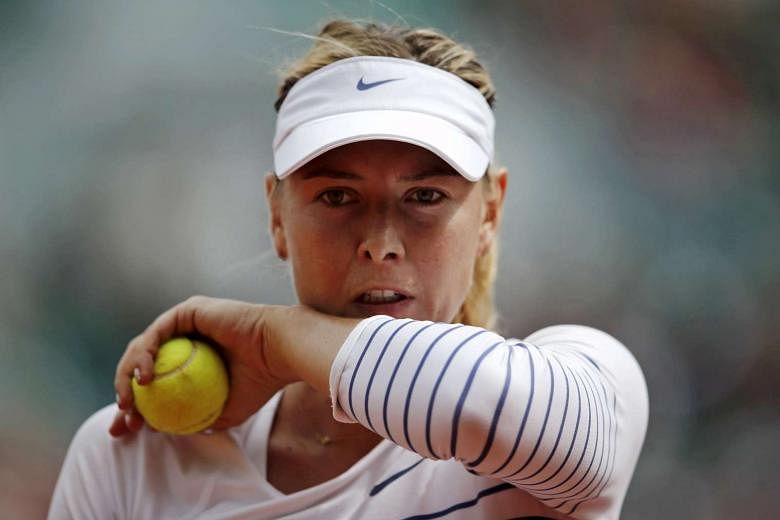The really baffling aspect of the Maria Sharapova suspension, in the age of million-dollar pay cheques and heightened global anti-drug vigilance, is that neither she nor her management, nor her coach Sven Groeneveld, nor the other members of her entourage even bothered to check an official e-mail dated Dec 22 last year that listed the latest additions to the list of banned substances.
So here are the consequences: Her career is under a considerable shadow. Her reputation has been tarnished. Her future in the sport is in doubt because she could potentially face a maximum ban of up to four years.
And she has no one to blame but herself and those around her who are paid substantial amounts of money to ensure that she abides by a raft of competition rules, which include the supreme need to avoid casting a footprint on the international drug radar.
In the current climate of increased scrutiny of athletes, coupled with heightened awareness and a greater responsibility to stay clean, combined with instant electronic access to drug updates and rule modifications, there is one inescapable truth for Sharapova. Put simply, a frank admission of guilt is not an escape route.
The 28-year-old Russian former world No. 1 is provisionally suspended by the International Tennis Federation (ITF) from March 12, pending further action, for having tested positive for meldonium, also known as mildronate. The substance was developed in Latvia and - according to Time magazine - used in Eastern Europe to treat serious heart problems and boost oxygen circulation.
Therein lies the problem. Meldonium, which Sharapova says was prescribed for her for an existing condition by her family doctor in 2006, can boost athletic performance and is therefore most recently categorised by the World Anti-Doping Agency (Wada) as a "metabolic modulator".
So let's put this in perspective. The Russian star has not taken masking agents to foil the testing process, nor has she taken erythropoietin (EPO) or even human growth hormone, nor is she guilty of blood doping, or boosting red blood cells to boost performance. But, unequivocally, she is guilty of continuing to take a substance that was added to Wada's list on Jan 1 this year.
No matter whether there are mitigating medical circumstances - to be debated in the ensuing weeks by Sharapova's legal team, Wada and the ITF - she has broken the rules that govern tennis, the first professional sport to introduce drug testing.
Her explanation? "I didn't click on the link." To say the least, she was startlingly naive and inexplicably negligent in not reading the fine print on the Wada e-mail from Dec 22. On the flip side, she was clearly unprofessional in not following the link provided by Wada to the full list of banned substances.
Not surprisingly, her lucrative contract with Nike was immediately "suspended" - as opposed to "ended" - in further proof that the sports giant will tolerate no grey areas in sponsorship deals with the world's most marketable names. Among several others dropped by Nike over the years are Oscar Pistorius, Lance Armstrong, Marion Jones and Justin Gatlin.
Two former world No. 1 players took different ends of the spectrum of opinions. Martina Navratilova echoed a conciliatory tone, tweeting: "hope this gets cleared up as it seems 2 me to be an honest mistake".
On the other hand, Jennifer Capriati called for Sharapova to be stripped of her titles if "it's all true". She said: "I... never opted to cheat no matter what. I didn't have the high priced team of (doctors) that found a way for me to cheat and get around the system and wait for science to catch up."
To Sharapova's credit, she was frank and open during the startling press conference in Los Angeles on Monday (Tuesday morning, Singapore time) at which she explained the situation. But it is also worth considering that the world No. 7, the highest-paid female athlete in international sport for more than a decade, was allowed by the Women's Tennis Association (WTA), the ITF and Wada, to break the news of her own volition, rather than to have the revelation made by one or all three of those organisations instead.
"I know that with this, I face consequences," said Sharapova in Los Angeles. "I don't want to end my career this way and I really hope that I will be given another chance to play this game."
Her former coach, the American professional player Jeff Tarango, immediately said it was unlikely she would face the maximum four-year ban. "I think it immediately falls under two years but with these circumstances, probably one year," he said.
So where does Sharapova go from here?
Not even she knows at this stage. Despite having delivered the bombshell news herself, she does not know yet what the consequences will be. "I just received the letter a few days ago and I will be working with the ITF," she said.
Certainly, there is an interesting series of legal precedents that could come into play in deciding the severity of the Sharapova ban, or the subsequent appeal process. Three other players - Marin Cilic, Viktor Troicki and Barbora Strycova - have all had bans for doping violations reduced, but it remains to be determined whether Sharapova's infringement falls into the same loophole.
This in itself raises another potentially ugly spectre for tennis. The sport has been under a cloud since the revelations at the Australian Open in January this year about previous instances of match-fixing and subsequent cover-ups.
Less than two months later, having its poster girl admit to failing a drug test - ironically, also at the Australian Open - is the last public relations disaster tennis wants or needs at this turbulent time.


